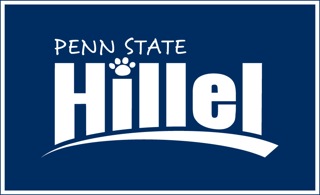 Last night, eleven organizations came together to hear the story of Judy Meisel, a Holocaust survivor and civil rights activist. I was fortunate enough to go to dinner with her and many of the other sponsors before the event. She is a very sweet woman. We talked about where she's from (Lithuania but lives now in Santa Barbara, CA after previously living in Philadelphia, PA), what she does now (she has worked on the Hillel Board at UCSB for 26 years working to get them out of a small room that barely fit a minyan to a brand new building) and some of her life experiences (she met Martin Luther King Jr and worked to help plan the March on Washington).
Last night, eleven organizations came together to hear the story of Judy Meisel, a Holocaust survivor and civil rights activist. I was fortunate enough to go to dinner with her and many of the other sponsors before the event. She is a very sweet woman. We talked about where she's from (Lithuania but lives now in Santa Barbara, CA after previously living in Philadelphia, PA), what she does now (she has worked on the Hillel Board at UCSB for 26 years working to get them out of a small room that barely fit a minyan to a brand new building) and some of her life experiences (she met Martin Luther King Jr and worked to help plan the March on Washington). After dinner, we made our way down to the auditorium for the event. She has a documentary made about her life experiences. It shows her reaction when a black family moved into her all white neighborhood--how this experience made her start talking about her own experiences in the Holocaust. She had not talked about it because she did not want to traumatize her children. But now that racism was apparent in her world, she no longer felt safe as a Jew in this neighborhood and spoke up for those who were being discriminated against. The movie then goes to show Judy revisiting the places she lived during her childhood: the house she was removed from when the Kovno Ghetto was formed, the house she lived in within the Kovno Ghetto, the rubber factory she worked at making boots for German soldiers, pictures of the round-up and deportation to the Stutthof Concentration camp, the gas chamber she was half into but managed to get away from, the farmhouse she ran to when the bombs were being dropped on Stutthof, the river she crossed to get from occupied Denmark to safe Sweden, and the Danish family that took her and her sister Rachel in when the war was over and nursed them back to health.
Judy used the movie to tell her story and when she spoke afterwards, it was not about what happened to her, but what she has done since then. She is a remarkable woman. Not many people could have gone through what she went through and lived, let alone talk about it. But Judy has done more. She has taken her experiences and worked hard to ensure that what happened to her never happens again. When it was happening to African Americans in the 1960, she no longer felt safe as a Jew thinking, "if they're being discriminated against, it's the same as if I'm being discriminated against."
She advocated for the end of bullying saying that "the Holocaust started with name-calling." Those simple actions then escalated into what we know as World War II. With the recent cyberbullying and suicides on college campuses, she urged us to think about what we say and the effect our words and actions have on others. If we do not stand up for what we know is right and stop someone from doing the bad action, it is as if we ourselves have done those bad actions. Her second appeal was for us to vote. We have the freedom to choose our government, and it is our responsibility to choose a government that will keep this country moving in the direction we want it to go. So many Americans take that right for granted while there are still so many people who do not have the right to choose who governs them.
Thank you so much to Judy Meisel, Bill Wallen, The Presidential Leadership Academy, The Jewish Studies Program, The Liberal Arts Undergraduate Council, Penn State Chapter of NAACP, MLK, Jr. Commemoration Committee, Schreyer Honors College, SPA Distinguished Speaker Series, Center for Ethics and Religious Affairs, University Park Undergraduate Association, and Students for Justice in Palestine for a truly remarkable program.


